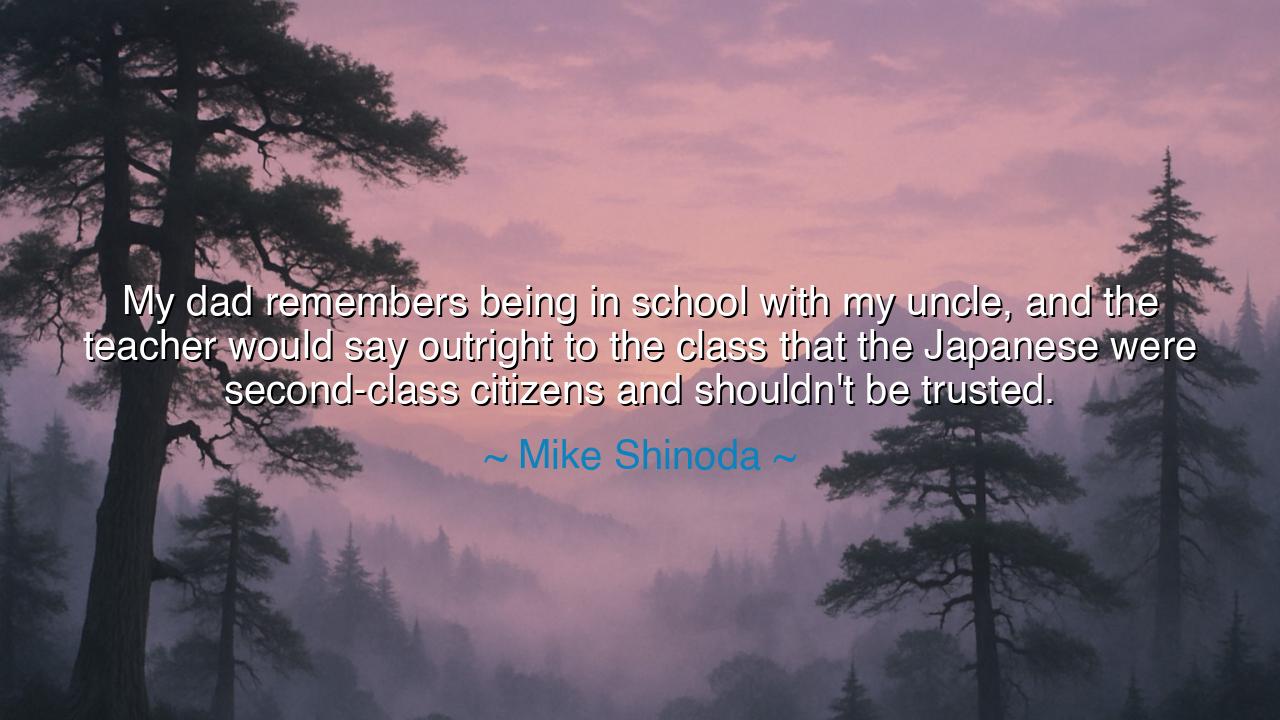
My dad remembers being in school with my uncle, and the teacher
My dad remembers being in school with my uncle, and the teacher would say outright to the class that the Japanese were second-class citizens and shouldn't be trusted.






When Mike Shinoda recalled, “My dad remembers being in school with my uncle, and the teacher would say outright to the class that the Japanese were second-class citizens and shouldn’t be trusted,” he was not merely recounting a memory. He was bearing witness to a wound etched into history, a moment when prejudice was not whispered in corners but declared openly by those entrusted to guide the young. In this single recollection, the clash between ignorance and innocence is laid bare: the voice of authority spreading division, and the hearts of children absorbing both the pain and the lesson of injustice.
The origin of these words lies in the dark chapters of American history, when fear and suspicion of Japanese Americans during and after World War II led to mass incarceration, systemic discrimination, and the branding of citizens as outsiders in their own homeland. For Shinoda’s father and uncle, the classroom—meant to be a sanctuary of learning—became instead a stage for humiliation. It revealed how deeply hatred can seep into institutions, shaping young minds with lies that deny the humanity of others. This memory is not only personal but collective, an echo of countless voices silenced by prejudice.
History provides us with countless parallels. During the Holocaust, Jewish children were told in their schools that they were inferior, even as laws stripped their families of rights. In South Africa under apartheid, Black students were fed a curriculum designed to keep them subservient. These examples remind us that the classroom, when poisoned by prejudice, can become an instrument of oppression. Yet they also remind us of resilience—for many who endured such teachings grew up to challenge and overturn those very lies.
The ancients too spoke against the arrogance of false hierarchies. Epictetus, himself once a slave, declared that no man is free until he understands that all human beings share the same dignity of reason. The Stoics taught that all are citizens of one great cosmos, bound together not by race or nation but by the breath of life itself. Against the teacher’s cruel proclamation of “second-class citizens,” the wisdom of the ancients resounds: there are no second-class souls.
The meaning of Shinoda’s quote is therefore both painful and profound. It shows how prejudice, when spoken with authority, can wound generations, but also how remembering such injustice can fuel the resolve to fight for truth. It is not simply a story about one teacher’s words—it is a story about how systems of bias perpetuate themselves, unless they are challenged by those who carry memory as a torch. Shinoda, as an artist, carries that torch through his music and words, transforming the sting of history into a call for compassion and justice.
The lesson for us is clear: we must never allow ignorance and hate to masquerade as truth, especially in places of learning. We must challenge prejudice wherever it appears, whether in a classroom, a workplace, or in the quiet corners of daily conversation. For silence in the face of injustice is itself a form of agreement, and agreement allows the poison to spread. The teacher who once spoke lies to children has long been silenced by time, but his words still echo until they are met with voices that speak truth louder.
Practically, let us live this teaching by examining our own words and the lessons we pass on. Teach children dignity, not division. Listen to the stories of those who carry the scars of prejudice, and let those stories guide your actions. Build classrooms, workplaces, and communities where every voice is heard and every soul is valued. For though ignorance may once have called some “second-class,” we know now with certainty that human worth admits no such rank.
Thus, Shinoda’s remembrance becomes more than a family memory—it becomes a warning and a guide. Prejudice spoken aloud can wound generations, but truth spoken with courage can heal them. Let us then be guardians of truth, teachers of justice, and builders of a world where no child ever hears that they are less than whole.






AAdministratorAdministrator
Welcome, honored guests. Please leave a comment, we will respond soon